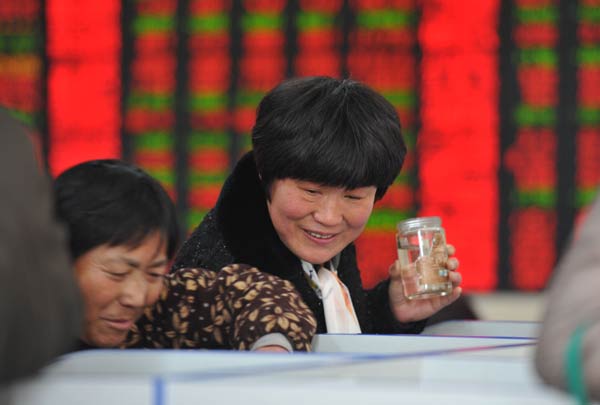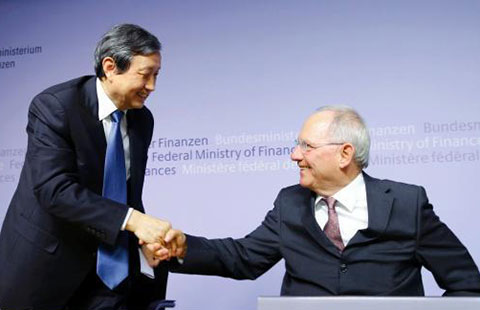Interest rate cut offers brief relief
By Chen Jia (China Daily) Updated: 2015-03-09 08:17
 |
|
Two investors check stock prices in a brokerage firm in Fuyang, Anhui province. The central bank's recent interest rate cut is expected to improve liquidity in the inter-bank market.[Provided to China Daily] |
The benchmark Shanghai Composite Index advanced 0.78 percent to 3,336.29 at the close of Monday, the first trading day after an interest rate cut, but closed the week down 2 percent, at 3,241.19 on Friday.
The People's Bank of China, the nation's central bank, following an earlier cut in November 2014, announced a 25 basis point cut in benchmark interest rates from March 1, at the end of the Lunar New Year holiday and just before the start of the annual sessions of the National People's Congress and the Chinese People's Political Consultative Conference.
After the cut, the one-year lending rate fell to 5.35 percent and the one-year deposit rate dropped to 2.5 percent.
"The timing indicates a new-found degree of urgency to lower interest rates amid downward pressures on growth and inflation," said Louis Kuijs, chief economist in China at the Royal Bank of Scotland.
A research note from Qilu Securities Co Ltd said that the rate cut will effectively improve liquidity in the interbank market, bring down the return rates of financial products and reduce the debt burden on companies.
"In the short term, investment opportunities will be seen in stocks related to construction and building materials, nonferrous metals and real estate," according to the report.
The central bank also increased interest rate flexibility by raising the ceiling for the floating interest rate for savings to 1.3 times the benchmark rate, up from 1.2 times. Benchmark interest rates are close to their lowest level in 10 years.
This interest rate cut should help lower the lending rate charged by banks. As an asymmetric rate cut, it could squeeze banks' interest margin, Wang Tao, chief economist in China at UBS AG, wrote in a note.
Commercial lenders' stocks may decline in the short term as the shrinking interest margin would increase operational pressure. But in the long term, they may rise as a result of fast growth in their loan business, said experts.
Real estate stocks will also benefit from the rate cut, as it can lower the debt burden of developers and encourage residents to buy houses.
In the long run, however, the A-share market may still remain under a pressure, as the intensified deflation will continue to drag down the growth.
The PBOC's decision to cut its benchmark rates came a day before a Chinese factory gauge signaled contraction in February.
The manufacturing Purchasing Managers Index for February edged slightly upward from a 28-month low of 49.8 in January to 49.9. The reading was still below the median of 50, showing the manufacturing industry is still contracting.
The output subindex slipped to 51.4 from 51.7 in January, meaning slower production growth, while the employment subindex dropped to 47.8 from 47.9, the lowest level since March 2013, indicating fewer new jobs were available.
- Israel requests to join Asian Infrastructure Investment Bank
- Chinese stocks rebound on April 1
- China, the West in Africa: more room for cooperation than competition
- Nanjing cuts taxi franchise fees
- Air China increases flights to Milan, Paris
- JD.com raises delivery charges
- Veteran corporate strategist upbeat about China economy
- L'Oreal China sales revenue up 7.7% in 2014

















